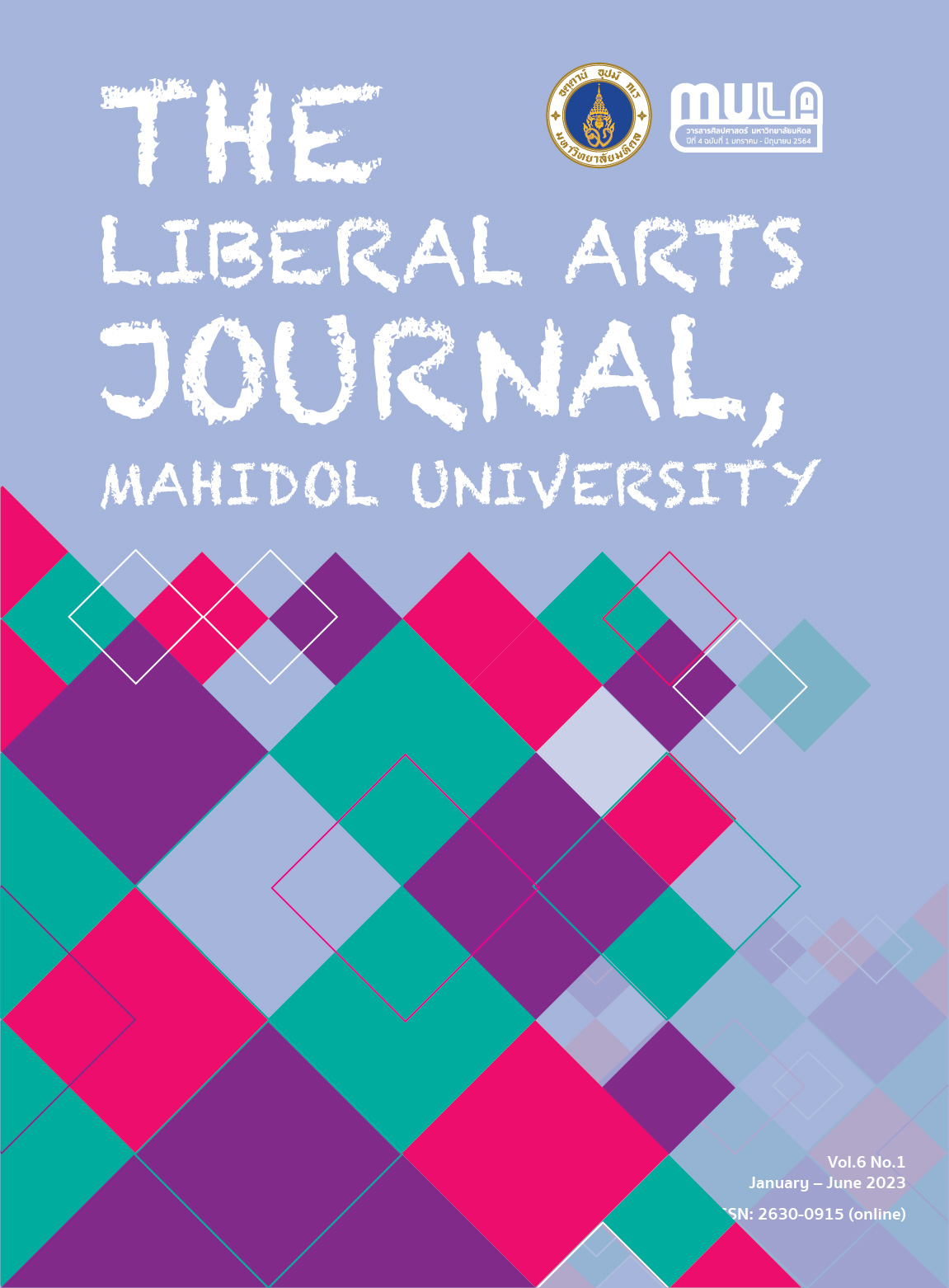The Promotion of Creative Tourism in a Secondary City by Connecting Small Local Communities to the Main Local Community Through Digital Media in Samut Songkhram Province
Keywords:
creative tourism, communities, digital media, Samut SongkhramAbstract
Digital media play a major role in tourism marketing, especially with regard to tourism destination positioning and the maximization of tourism revenue. The outcome of this research was the development of digital media to promote creative tourism in a secondary city by connecting small local communities to the main community in Samut Songkhram province. The research has two purposes: first, to create creative tourism routes connecting small local communities to major communities; and second, to produce digital media to promote these creative tourism routes through community participation. The research took the form of PAR (Participatory Action Research), utilizing qualitative methods (i.e. in-depth interviews and focus groups) to collect and analyze data.
The research resulted in the development of four creative tourism routes connecting peripheral communities to the main local communities in Samut Songkhram province: (1) a salt farm route;
(2) a fishing village route; (3) a religious site route; and (4) a floating market and homestay route. These routes are connected to key local community centers, namely Amphawa Floating Market and Mae Klong Market in the Amphawa district. From these four routes, two digital media products were developed: the Android application
“Go Samut Songkhram”, which provides interactive maps and information about creative tourism routes and communities in a way that connects small local communities to major communities; and a video clip hosted on Youtube to promote creative tourism routes. The research results reflect the importance of developing digital media for tourism so as to connect tourist destinations to distribute tourism revenue equitably. Cooperation between stakeholders is also significant in the development of sustainable tourism marketing.
References
Academic office: National Assembly Library of Thailand. (2018). Thai tourism in the digital era. Retrieved February 16, 2023. https://www.parliament.go.th/ewtadmin/ewt/parliament_ parcy/ewt_dl_link.php?nid=51776&filename=index
Bangkokbiznews. (2021). ‘Go Samut Sonkhram’ Travel Application in Samut Sonkhram province. Retrieved Feb17, 2023. https://www.bangkokbiznews.com/news/detail/952522
Bassano, C., Barile, S., Piciocchi, P., Spohrer, J.C., Iandolo, F., & Fisk, R. (2019). Storytelling about places: Tourism marketing in the digital age. Cities, 87, 10-20
Bhawonkulkijtawee, N. (2011). The impact of the expansion of tourism business on local communities Amphawa Floating market, Samut Song khram. Master of Business Administration Program in Entrepreneurship. Nakhon Pathom: Silpakorn University
Designated Areas for Sustainable Tourism Administration. (2018). Low carbon tourism. TAT Review, 4(3), 54-57. Retrieved May 1, 2019. https://www.tatreviewmagazine.com/ e_magazine/vol-4-no-3-july-september-2018-3/
Economics Tourism and Sports Division, Ministry of Tourism and Sports. (2019). Samut Songkhram tourism statistics by month for 2018. Retrieved May 1, 2019. https://samutsongkhram. mots.go.th/ewt_dl_link.php?nid=425
Faculty of Liberal Arts, Rajamangala University of Technology Phra Nakhon. (2023). Travel in the secondary city of Samut Songkhram. [Video]. YouTube. https://www.youtube.com/watch?v=xJC1W1jk6Ig
Garbani-Nerini, E., Korkut, S., & De Ascaniis, S. (2022). Chapter 9: Better: Digital media can make tourism experiences at heritage destinations better. In Handbook on Heritage, Sustainable Tourism and Digital Media. Cheltenham: Edward Elgar Publishing.
Hamilton, K., & Alexander, M. (2013). Organic Community tourism: A cocreated approach. Annals of Tourism Research, 42, 169-190.
Hunnark, C. (2015). A Study of The Connection of Tourist Sites in Samut Songkhram province. Valaya Alongkorn Review, 5(2), 113-124.
Junead, J. (2016). Development guidelines for sustainable Tourism Samut SongKhram Province. Liberal Arts Review, 11(21), 55-67.
Kamnedsin, K. (2017). The participation of local people in Bangnamphueng Community in managing the ecotourism and cultural tourism. Journal of Information, 16(1), 175-184. Retrieved May 1, 2019. https://so03.tci-thaijo.org/index.php/ oarit/article/view/106051
Keitpiriya, S., Busaman, S., Phetcaot, K., & Chaiwong, A. (2020). Secondary City Tourism Promotion with Digital Media. Journal of MCU Nakhondhat, 7(12), 436-449.
Ministry of Tourism and Sports. (2017). Tourism development plan no. 2: 2017-2021. Retrieved October 15, 2017. https://www.mots.go.th/download/article/article_20170320150102.pdf
National News Bureau of Thailand. (2021). National Research Council of Thailand (NRCT) announces the application “Go Samut Songkhram”. Retrieved Feb17, 2023. https://thainews.prd.go.th/th/news/detail/TCATG210803163446978
Pencalerelli, T. (2020). The digital revolution in the travel and tourism industry. Information Technology & Tourism, 22, 455-476.
Richards, G., & Raymond, C. (2000). Creative tourism. ATLAS News, (23), 16-20.
Sangkawan, S. (2017). The Strategies for developing Ecotourism Attractions in Samut Songkhram province. Journal of Management Science, Nakhon Pathom Rajabhat University, 4(1), 1-9.
The Thailand Community Based Tourism Institute. (2012). Community –Based Tourism –CBT. Retrieved May 1, 2019. https://thaicommunitybasedtourismnetwork. wordpress.com/cbt/
The United Nations Educational, Scientific and Cultural Organization (UNESCO). (2006). Towards sustainable strategies for creative tourism: Discussion report of the planning meeting for the 2008 International Conference on Creative Tourism. Retrieved January 12, 2018. https://unesdoc.unesco.org/ ark:/48223/pf0000159811
Tourism Authority of Thailand. (n.d.). Amphawa Floating Market. Retrieved February 16, 2023. https://thai.tourismthailand.org/Attraction/%E0%B8%95%E0%B8%A5%E0%B8%B2%E0%B8%94%E0%B8%99%E0%B9%89%E0%B8%B3%E0%B8%AD%E0%B8%B1%E0%B8%A1%E0%B8%9E%E0%B8%A7%E0%B8%B2
Yanopas, N. (2018). Digital tourism innovation. Journal of Kanchanaburi Rajabhat University, 7(2), 1-8.
Downloads
Published
How to Cite
Issue
Section
License

This work is licensed under a Creative Commons Attribution-NonCommercial-NoDerivatives 4.0 International License.




